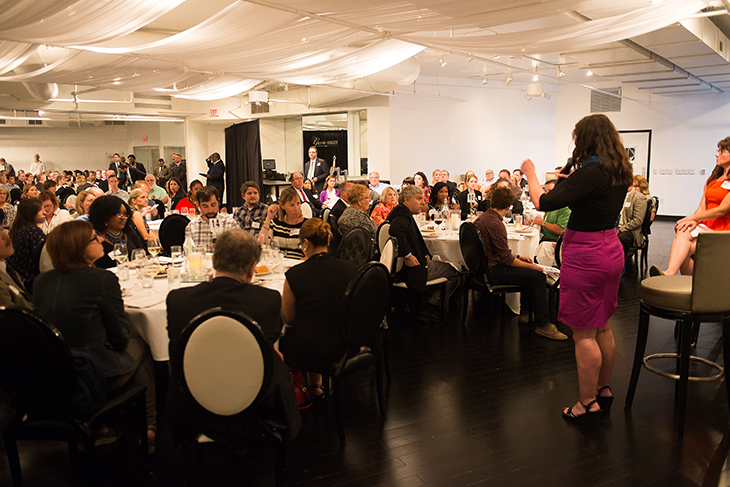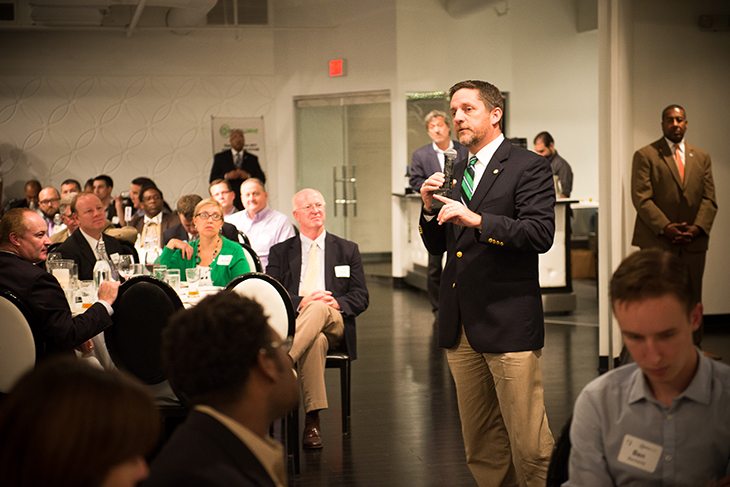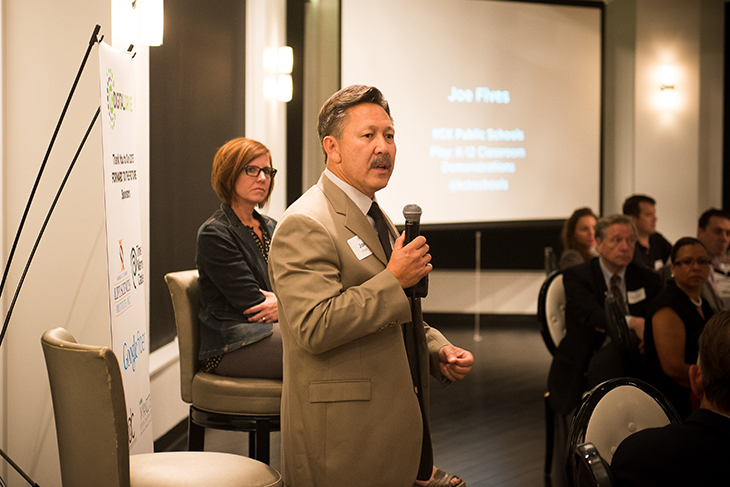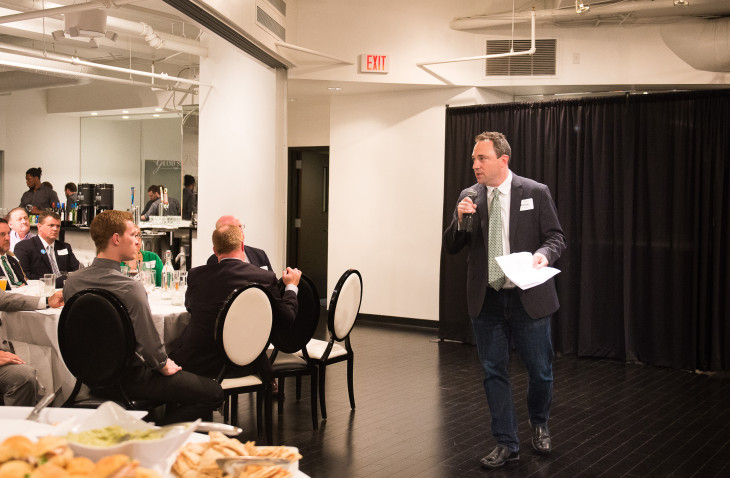Creating a Culture of Social Entrepreneurship
The Kansas City area has seen lots of change over the last half century. Not all of it has been good.
Taking one side of the city as an example: Between the years 1960 and 2000, over 30,000 people moved out of . Kansas City, Kansas. During that mid-20th-century “white flight” era of suburban growth, 60,000 white people fled KCK and 30,000 people of color moved in. While the ethnic makeup became more diverse than almost anywhere in the nation – certainly an improvement in many ways – the median household income dropped to 20% below the average.
In recent years, the area has seen a slow but steady rebound. This is often credited to the establishment of the Unified Government of KCK and Wyandotte County in 1997 and the economic growth as a result of more organized, intentional leadership. You see its impact across Wyandotte County – from the Legends and Sporting Park developments in the west, to young people moving into houses along State Line Road in the east. In 2010, KCK logged its first net population gain in 50 years.
All of this, according to current Mayor Mark Holland, has made KCK a city that is primed to take advantage of the human empowerment that highspeed broadband technology can bring to a city.
“It’s put us in a position where we can uniquely take advantage of the opportunities of the Digital Drive in a way that we couldn’t have 20 years ago,” Holland said.
Mayor Holland was one of many prominent community leaders who spoke at KC Digital Drive’s Forward to the Future event on August 18, 2015, at Grand Street Café. Billed as a Civic Tech Cocktail Reception and Futureraiser, the event attracted around 175 people from the civic, corporate and public service sectors to learn about the community-led innovation that has happened in the Kansas City area since the arrival of Google Fiber and the subsequent authoring of the Digital Playbook three years ago.

175 people came to hear speakers like Carrie Coogan (foreground) at KC Digital Drive’s 2015 fundraiser.
As Mayor Holland talked about the ways KCK has changed over the years – slowly at first then more rapidly – a picture emerged of powerful evolution, driven by technology, right outside our door.
“There are an infinite number of ways that the city can be better at what we’re doing because of the Digital Playbook and the Digital Drive, and the partners we have around us that can help make it happen,” Mayor Holland said.
Some specific pilots Mayor Holland mentioned included using technology to improve public health, making the web more accessible to small business owners and churches, opening the city’s budget data, and providing on-service training for firefighters over video.
This trend of improving people’s lives in a city through technology is not unique to KCK – it is at the core of KC Digital Drive’s vision for the entire Kansas City region. And as the evening progressed last Tuesday night, a cavalcade of stories from local and national leaders in entrepreneurship, healthcare, education and government services ensued.
We captured the whole thing on tape, and the videos are linked below. (You can also read a nice recap by the KC Business Journal here.)
But first, a word about the future. Because, after all, while the work over the past three years in leveraging technologies like gigabit fiber has been great, our job is nowhere near finished.
What’s Next for the Future of KC?
In his keynote address, KC Digital Drive director Aaron Deacon asked: “How do we build a culture that knows how to look for what’s coming next? How do we figure out how to use technology to make people’s lives better and how to guide that process in a human, intelligible, heartfelt and social way?”
At KC Digital Drive, we answer these questions by starting with the people. By choosing to focus on people’s needs, desires, and strengths, we develop models for how to use technology in ways that benefit the entire community, not just the business infrastructure.
As Deacon explained: “We want to create a culture here not just about entrepreneurship, where we’re trying to create new businesses – but social entrepreneurship, where we’re creating new projects, new platforms, new ideas, that can improve people’s lives.”
This starts with ensuring that everyone is connected to fiber and has an equal chance at accessing the empowering Internet. It continues by seeking out and supporting people who experiment with technology to address education, healthcare and other social-good areas.
And finally, it ends by shaping the future of Kansas City – so that the old broken-down and divided cities of the past really are of the past.
If you want to be a part of our mission of making Kansas City a digital leader, check out the links below:
Ways to Get Involved
- Contact Us: Set Up a Meeting: Call Aaron Deacon at 913.475.9885 or email adeacon@kcdigitaldrive.org
- Subscribe: Sign up to our Email List
- Donate Directly: Give to Our Organization via PayPal
Videos from the Event
- Digital Skills Training and Telehealth Pilots: Carrie Coogan (KC Library) and Morgan Waller (Children’s Mercy)
- KCMO Mayor Sly James
- KCK Mayor Mark Holland
- K-12 Classroom Demonstrations: Joe Fives (KCK Public Schools) and Kari Keefe (Think Big Foundation)
- Mayors Bistate Innovation Team (MBIT)’s address: Ray Daniels and Mike Burke
- Proof-of-Concept Labs and IT Workforce Development: Jeff Shackelford (Digital Sandbox) and Ryan Weber (KCnext)
- Keynote: KC Digital Drive’s Aaron Deacon
- Access to Capital and Gigabit Ecosystem Building: Drew Solomon (Launch KC) and Dominique Davison (PlanIT Impact)
- National Panel: “The Case for Supporting People-Centered Technology” – Luke Norris (Code for America, moderator), Deb Socia (Next Century Cities), Dane Stangler (Kauffman Foundation) and Alaina Harkness (MacArthur Foundation)
- Innovation Hubs and Digital Inclusion: Adam Arredondo (KCSV) and Cheptoo Kositany-Buckner (KC Library)
Photos
- Click for a Photo Gallery by Chris Walter
Twitter: #FutureKC
Thanks to Our Sponsors
KC Area Life Sciences Institute
Wyandotte Economic Development Council



